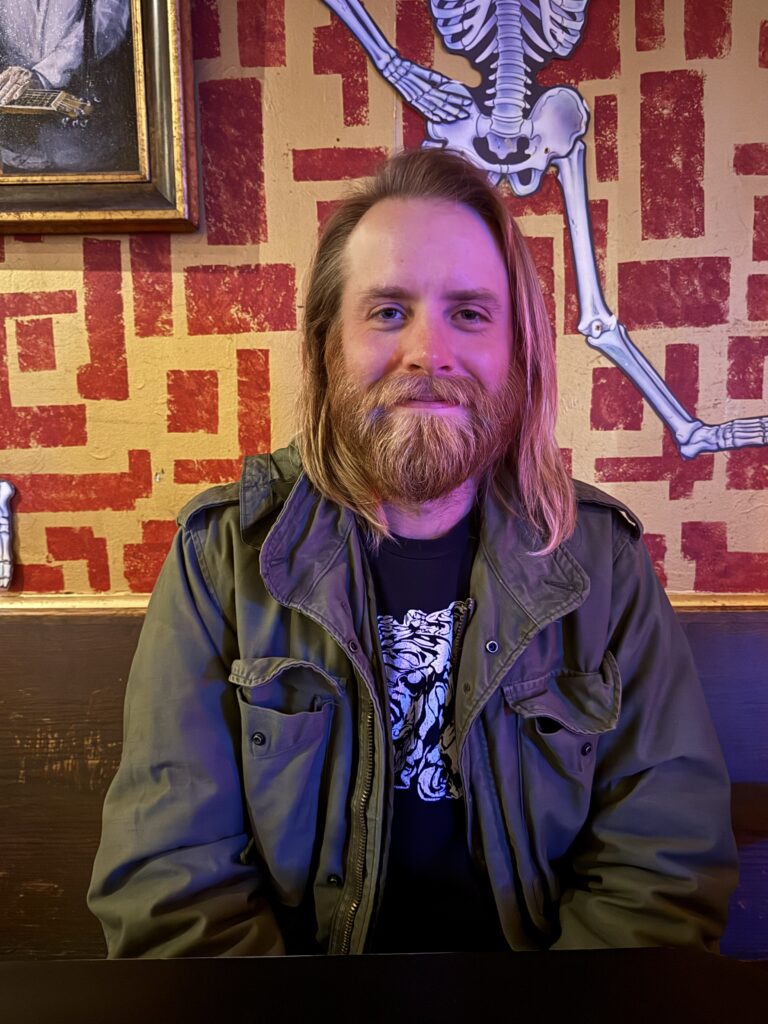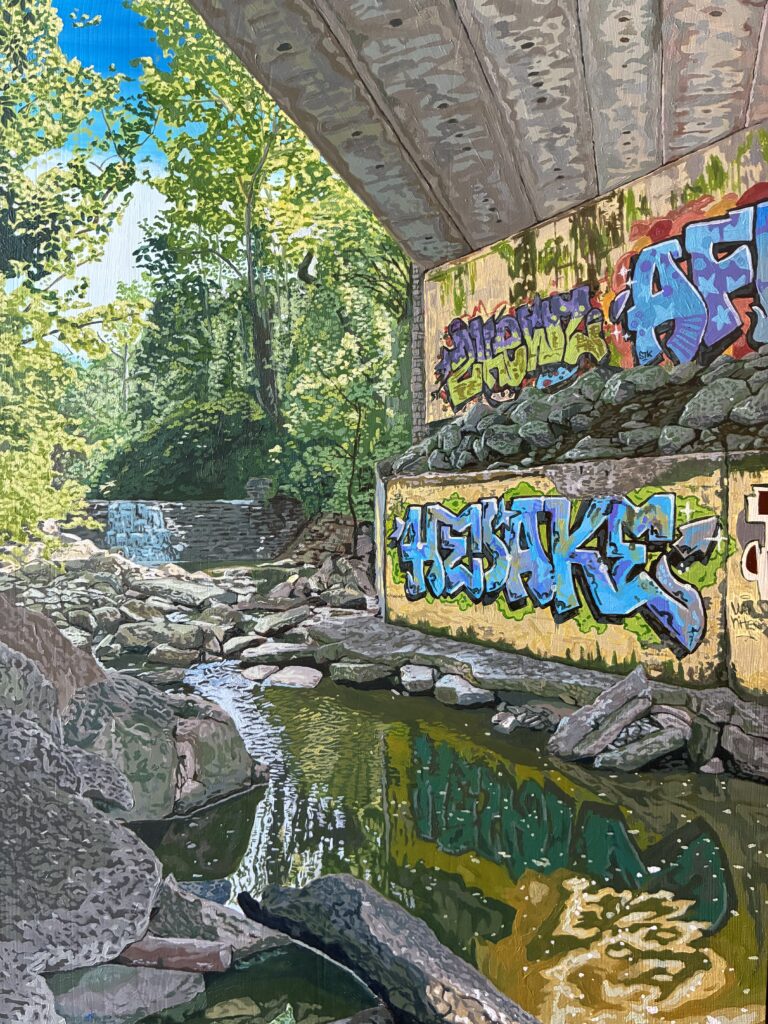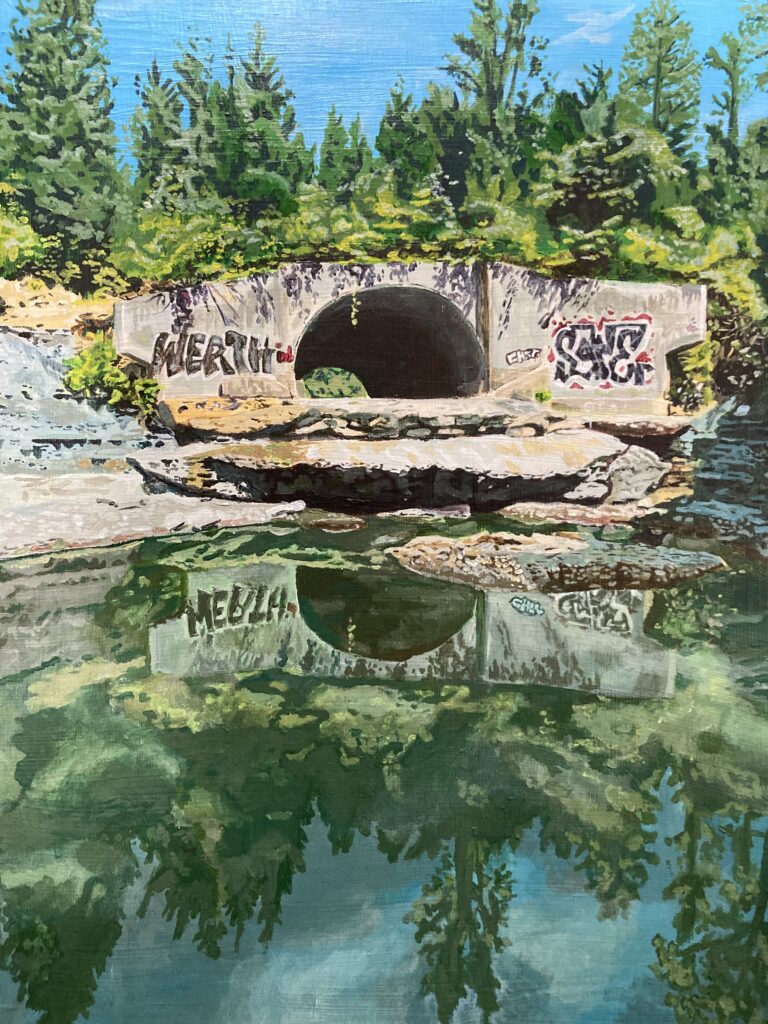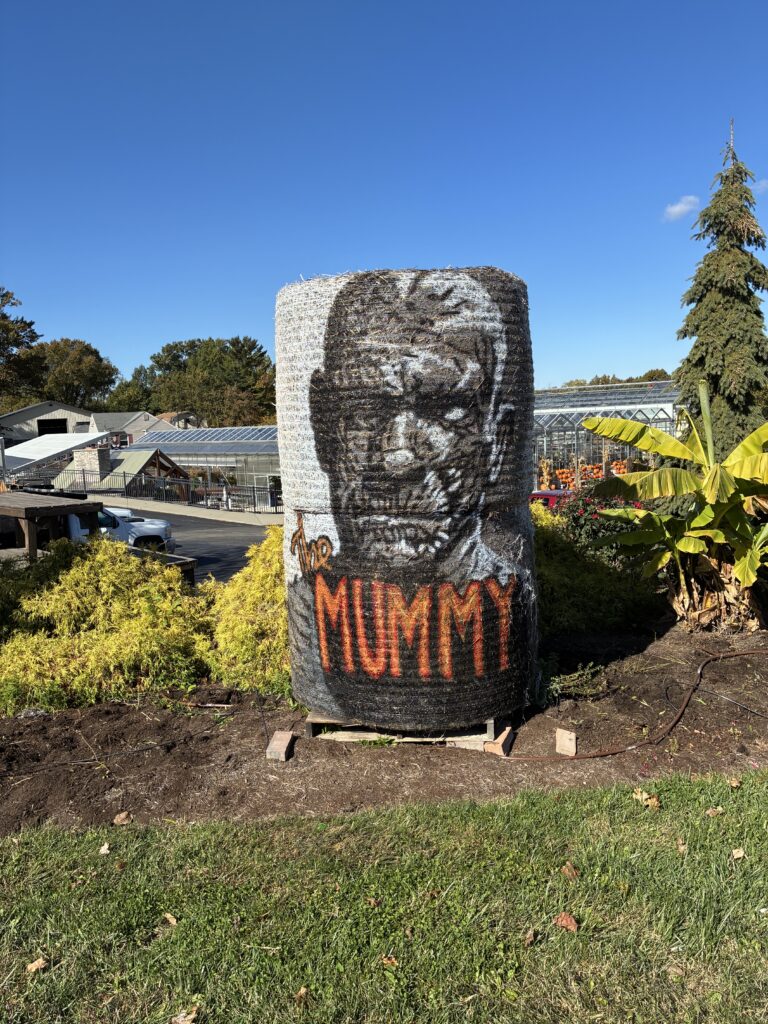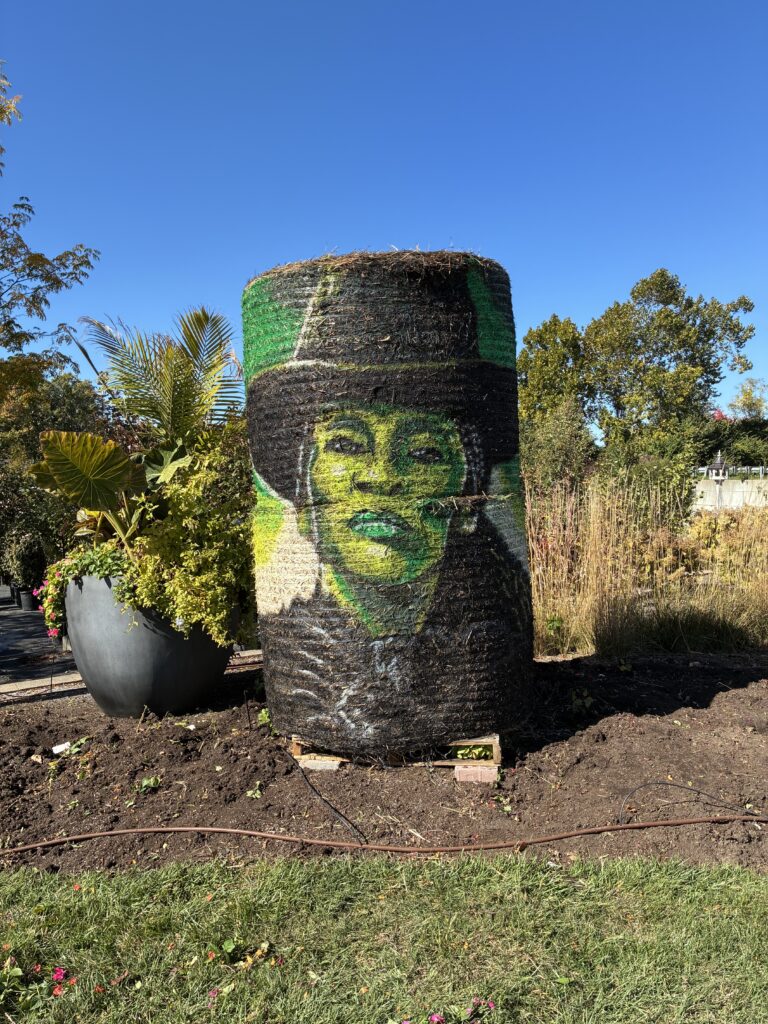Ross Bicknaver (AAC 2008)
It’s early evening at The Comet in Northside, and Ross Bicknaver guides us to a table against the wall with the long, varnished church pew that doubles as a bench; the kind of reclaimed furniture that has seen both salvation and more than a few stories over many nights of tequila. Behind him is the funky hand-painted vintage wall mural The Comet has come to be known for, adorned with seasonally appropriate paper skeletons, one of which, naturally, is made to look like it’s holding a burrito. The light in the room is simultaneously dim and high contrast, with a slightly pink glow on the room from the neon around the front windows. It’s the kind of light that makes everyone look more interesting, or maybe just more honest.
Before we get started, he and I have a bit of a laugh because Television’s ‘Marquee Moon’ starts to spill from the legendary Comet jukebox and it’s both a “Comet song” and a spooky soundtrack entry for both of us. We both needed that laugh after the shared mourning of the recent loss of Dave Cunningham, beloved owner of The Comet. The whole building still mourns. Spoiler alert: Ross and I both worked under Dave and at The Comet at the same time for quite a few years together, so this interview is a bit of a homecoming, particularly within the context of these specific walls.
Seventeen years ago, Ross Bicknaver was a wild-eyed fresh graduate from the Art Academy of Cincinnati. He was in the last freshman class of the AAC to study “on the hill” in Mt. Adams before the school moved to its current location in Over-The-Rhine. There’s something serendipitous about that intersection: a school in transition, a city in transition, and a young artist about to live in both versions, one foot in the old, and one foot in the new.
He had initially chosen the Art Academy after graduating from Oak Hills High School here in Cincinnati partly because his sister, Britni, was attending, but also partly because of the feeling he got when he visited. “I really liked the vibe,” he says. “It felt like you could do anything you wanted artistically. Nobody was there telling you what you had to be.”
Ross still remembers two teachers from Oak Hills High School, Dick Mackie and Steve Groh, who first told him he had something worth pursuing. “They believed in me,” he says. “Which is always pretty nice.” When he got to the Art Academy, he then studied under professors who carried that same spirit, that same push to keep Ross afloat. Kim Krause, Paige Williams, and Gary Gaffney all noted, pushing him hard, and somehow, miraculously, all of them believing in him. “Gary was always on me, but only in that way that meant he cared,” Ross says. “He could see something in me that I couldn’t yet.”
“I just did what I loved,” he says. “Art was the only thing that ever made sense, but I didn’t always know what to do with it.” That could sound like regret, but Ross doesn’t say it that way. It’s more like he’s describing weather — a period of long, overcast days that you don’t realize were part of a season until the sun returns.
After graduation in 2008 and feeling a little lost on what to do next, he got into bartending because it was easy, and the money was good; working first at a few bars in Mt. Adams, back where he started at the AAC, then moving to The Comet. Ross spent fifteen years behind the bar there, learning the rhythms of late-night philosophy and low lighting, of the regulars who’d sit until last call arguing about film, punk bands, and the local music scene. He thought he was going to end up as a career bartender.
The bar world can be intoxicating in ways that have nothing to do with alcohol: the camaraderie, the energy, the immediacy of it, and on a good night, the money. But it’s also a place where time starts to stretch and warp in ways beyond one’s own recognition. So Ross finally decided after a long run to stop bartending. At that same time, he also decided to stop drinking. The decision to become sober wasn’t dramatic, no single moment of collapse or clarity. Just a growing realization that he wanted to feel present again.
The funny thing is that sobriety didn’t make him retreat from the world. “I still come here, obviously,” he says, smiling, running a hand through his long blonde hair. “I just come for the people and the music now. And maybe a burrito.”
“Alcohol ended up taking up a big part of my life,” he says, sipping a NA can of some sort of not-beer. “When I quit drinking, I immediately got back into painting. Like, for real this time.” And once he started, he just kept going. The practice of art was saving him in a way that didn’t click right away but became more obvious as he went down this path. His initial work was illustration, getting back in the saddle. His paintings these days, though, are nearly photo-real depictions the fight between nature and urban environments and he’s documenting the entire progress of each piece on his social media accounts. Art, for Ross, isn’t a performance or a destination. It’s a way of being slightly more awake in the world, of noticing light and pattern, of staying curious.
Ross now works at the White Oak Gardens, and has for a year and a half now… a job he landed in a perfectly Cincinnati way: through a regular at the bar. “I used to do landscaping back in college,” he says. “When I stopped bartending, I first looked at florist jobs, but those are pretty niche. Then I ran into a regular at 2nd Place in Northside, and she got me in the door.” He said it’s a nice change: making art, spending his days driving a Bobcat, learns about plants, and, occasionally, finding ways to turn the job also into art.
It’s the kind of career twist that feels accidental but isn’t. Ross seems to find meaning in motion in the doing, not the declaring.
Last month, he was hired by the center to do a pretty cool art project involving spray painted hay bales that ended up getting a lot of attention, specifically White Oak Gardens regular, Local 12’s Jen Dalton, who did a piece on the station because she loved it so much. “The first time I got paid to make art” he laughs. “It was kind of surreal. Like, finally.” When I mention the spot, Ross blushes. You can tell he’s not a spotlight kind of guy.
Back in his twenties, Ross’s idea of success was simple: just be an active artist. Not a careerist, not a commercial machine — just someone making work because it needed to exist. “If art was part of my daily life, that was the win,” he says.
Now, he’s older and — in his words — “weirdly more productive than I’ve been since college.” His new definition of success is quieter, but somehow bigger: to make art that makes him a better person. “I never took the measures of the world to heart”, he says with a pause. “I always just had my own scale. But now the measure is how I feel overall. Feeling better as a person has made me a better artist. It’s kind of circular.” Ross’ words immediately remind me of a Henry David Thoreau quote I’ve always been fond of: If a man does not keep pace with his companions, perhaps it is because he hears a different drummer. Let him step to the music which he hears, however measured or far away.
The quiet advice he got at the AAC that still sticks with him today is simple: “I guess I learned that you can’t make good art if you’re trying to be someone else’s version of yourself.” It’s the sort of thing that sounds obvious until you try living it.
When asked what keeps him up at night, he grins. “Oh man… probably what the next painting is going to be.” He’s in the middle of a series right now, but his brain, he admits, tends to skip ahead. “I think forward a lot,” he says. “That can lead to anxiety, but mostly it’s just excitement. Wondering what’s next creatively.”
The momentum shows. “I’m working on putting together my first show since college,” he tells me. “I’ve got enough work now — I just need a space.” He says this casually, like someone mentioning they might repaint their kitchen. But it’s actually a pretty big deal; his first solo show and first show since his thesis show back in 2008. The idea feels both overdue and perfectly timed.
And maybe that’s the quiet thesis of it all: that art isn’t something you leave behind or return to — it’s the through-line, the hum underneath every version of yourself. For Ross Bicknaver, it’s not about reinvention. It’s about finally catching up with the person who was there all along.
